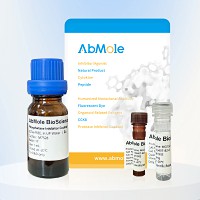All AbMole products are for research use only, cannot be used for human consumption.

In vitro: Ipilimumab, is a fully humanized IgG1k monoclonal antibody produced by recombinant DNA technology in a CHO mammalian cell expression system, binding with high affinity to the extracellular domain of human (and Cynomolgus monkey) CTLA-4, and acting as an inhibitor of its complex functions. This essentially results in T-cell activation and proliferation, and in lymphocyte infiltration leading to tumor cell death. However, the enhancement of T effector cell function, combined with the inhibition of CD4+ Treg and CD8+ suppressive cell types, are considered essential for mediating the full therapeutic effects of ipilimumab. Ipilimumab can improve ATC proliferation, enhance the BiAb-mediated tumor-specific cytotoxicity, and increase cytokine synthesis, while it attenuates Treg activity as shown by decreased level of IL-10 secretion and reduced Treg population. Ipilimumab and nivolumab treatments could collaboratively enhance effector and memory T cell responses without inappropriately activating naive T cells.
In vivo: Ipilimumab enhances antitumor immunity by inhibiting immunosuppressive activity of regulatory T cells (Treg).
MW: 148 kD.

Patent. AU2020419444A1 2022 Jun 09.
Patent. AU2020419444A1
Ipilimumab purchased from AbMole

Patent. WO2021136808A1 2021 Jul 08.
Patent. WO2021136808A1
Ipilimumab purchased from AbMole
| Cell Experiment | |
|---|---|
| Cell lines | PBMCs |
| Preparation method | Add ipilimumab at the initiation of ATC expansion cultures from healthy donors at various concentrations ranging from 0 to 50 μg/mL. ATC(activated T cells) are harvested on day 14, armed with EGFRBi or CD20Bi, and co-cultured at 25:1 E:T(effector:target) ratio for 18 hours with EGFR positive pancreatic cancer cell line (COLO356/FG) or 4 hours with CD20 positive Burkitt's lymphoma cell line (Daudi) for cytotoxicity assay. BiAb-mediated tumor specific cytotoxicity is measured by 51Cr release assay. |
| Concentrations | 0, 0.5, 5.0, and 50 μg/mL |
| Incubation time | 14 days |
| Animal Experiment | |
|---|---|
| Animal models | Purpose-bred cynomolgus monkeys |
| Formulation | Saline |
| Dosages | 3 mg/kg or 10 mg/kg |
| Administration | i.v. |
| Molecular Weight | 148631.92 |
| Formula | C6742H9972N1732O2004S40 |
| CAS Number | 477202-00-9 |
| Storage | -80°C for long term |
[5] Robert C, et al. N Engl J Med. Pembrolizumab versus Ipilimumab in Advanced Melanoma.
| Related Checkpoint Products |
|---|
| PV-1019
PV-1019 (NSC 744039) is a potent, selective Chk2 inhibitor with an IC50 value of 24 nM. PV-1019 inhibits IR-induced apoptosis. |
| CCT241533 dihydrochloride
CCT241533 dihydrochloride is a potent and selective ATP competitive inhibitor of CHK2 with an IC50 of 3 nM and Ki of 1.16 nM. |
| CBP501 Affinity Peptide
CBP501 Affinity Peptide is a Chk kinase inhibitor that can abrogate G2 arrest induced by DNA-damaging agents. |
| Chktide
Chktide is a substrate for CHK1 and CHK2. |
| Zn-DPA-maytansinoid conjugate 1
Zn-DPA-maytansinoid conjugate 1 is a small molecule-based maytansinoid conjugate targeting immune checkpoint. |
All AbMole products are for research use only, cannot be used for human consumption or veterinary use. We do not provide products or services to individuals. Please comply with the intended use and do not use AbMole products for any other purpose.


Products are for research use only. Not for human use. We do not sell to patients.
© Copyright 2010-2024 AbMole BioScience. All Rights Reserved.
